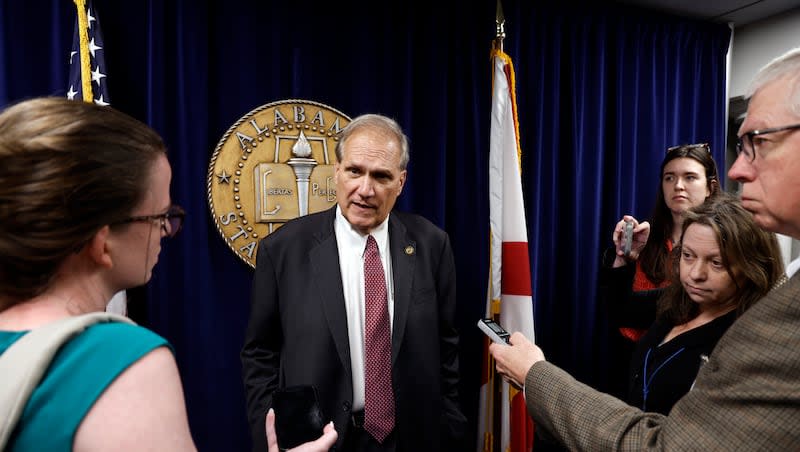Alabama’s IVF battle: A timeline of key events

- Oops!Something went wrong.Please try again later.
IVF treatments in Alabama moved to firmer legal footing Wednesday when Gov. Kay Ivey signed a bill protecting patients and medical providers.
State lawmakers crafted the IVF bill in response to a state Supreme Court ruling stating that “frozen embryos are people and individuals could be held liable for destroying them,” according to The Washington Post.
The new law gives IVF patients and providers criminal and civil immunity from lawsuits related to the ruling.
Fertility clinics that paused treatments after the Feb. 16 Alabama Supreme Court decision have already begun resuming them, The Washington Post reported.
Here’s a look at the key events that led to Wednesday’s bill signing and what could happen next.
Timeline of Alabama’s IVF dispute
December 2020 — Frozen embryos belonging to several couples are destroyed when a patient at Mobile Infirmary Medical Center in Mobile, Alabama, wanders into the embryo storage facility, attempts to pick up some embryos and then drops them on the ground.
Three of the affected couples sue the hospital and the Center for Reproductive Medicine, alleging wrongful death.
The trial court dismissed one suit involving two of the couples and most of the claims in the second suit after determining that Alabama’s Wrongful Death of a Minor Act does not apply to frozen embryos.
Feb. 16, 2024 — The Alabama Supreme Court rules that embryos created through IVF and kept frozen in labs can be considered children under the Wrongful Death of a Minor Act.
“The central question ... is whether the Act contains an unwritten exception to that rule for extrauterine children — that is, unborn children who are located outside of a biological uterus at the time they are killed. Under existing black-letter law, the answer to that question is no: the Wrongful Death of a Minor Act applies to all unborn children, regardless of their location,” the ruling said.
Feb. 21, 2024 — The University of Alabama at Birmingham Health System cites the ruling to explain why it’s pausing IVF treatments.
“We are saddened that this will impact our patients’ attempt to have a baby through IVF, but we must evaluate the potential that our patients and our physicians could be prosecuted criminally or face punitive damages for following the standard of care for IVF treatments,” said Hannah Echols, a spokesperson for UAB, in a statement about the health system’s decision to NBC News.
The next day, two other major IVF providers in the state put their own IVF programs on hold.
Feb. 23, 2024 — Former President Donald Trump responds to the Alabama ruling on social media, expressing support for IVF treatments.
“Under my leadership, the Republican Party will always support the creation of strong, thriving, healthy American families. We want to make it easier for mothers and fathers to have babies, not harder!” he wrote, according to The Associated Press.
Trump was one of several Republican leaders to defend IVF, USA Today reported. “I’d have several fewer grandkids if we didn’t have IVF,” said Sen. Mitt Romney.
Feb. 27, 2024 — A bill aiming to protect IVF services in the state is read for the first time in the Alabama Senate.
The bill protects IVF patients and treatment providers with immunity from potential prosecution under the Wrongful Death of a Minor Act. Sponsors and others refer to it as a short-term solution.
“We are providing with this legislation a pretty broad immunity at this moment in time which to me gives us the impetus to continue to work on this issue for a long term fix,” said Rep. Terri Collins to NPR.
March 6, 2024 — The Alabama Legislature passes the IVF bill and Gov. Kay Ivey signs it.
“Let me say clearly: Alabama supports growing families through IVF,” Ivey said when signing the bill, according to The Washington Post. “From protecting the unborn to supporting IVF, Alabama is proud we are a pro-life, pro-family state.”
“The legislation is designed to allow patients and clinics to immediately restart IVF treatments in Alabama, without fear of legal repercussions if embryos are damaged or destroyed during the medical procedure or related services like embryo storage and shipment,” NPR reported.
Future of IVF treatments in Alabama
Following the bill’s passage, IVF providers in Alabama that had put services on hold announced plans to resume treatments.
In that sense, the policy accomplished its goal. But it did leave questions unanswered, including when life begins.
“State Republicans are reckoning with a crisis they partly helped create with anti-abortion language added to the Alabama Constitution in 2018. The amendment, which was approved by 59% of voters, says it is state policy to recognize the ‘rights of unborn children,’” according to The Associated Press.
One of the bill’s sponsors, Republican Sen. Tim Melson, who is a medical doctor, acknowledged to NPR that many difficult conversations remain to be had.
“I think there’s just too much difference of opinion on when actual life begins,” he told NPR. “A lot of people say conception, a lot of people say implantation, a lot of people say heartbeat. ... I wish I had an answer.”

